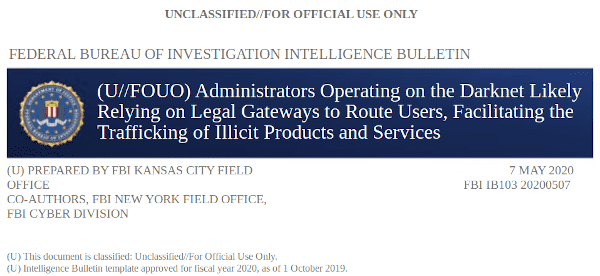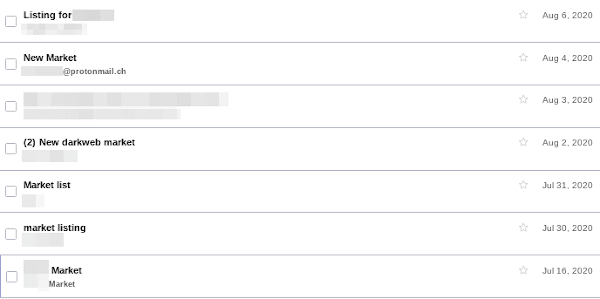Fact Check: Feds Did Not Accuse Dark.Fail of a Crime
A leaked FBI document mentions Dark.fail, Dark Eye, Darknetlive, and other onion indexes but the FBI does not refer to any of them as criminal enterprises or claim they are involved in criminal activity.
Several weeks ago, DDOSecrets released a cache of more than 250 GB of files and documents from “police departments, fusion centers and other law enforcement training and support resources.” BlueLeaks, the name given to the dump, contained a small number of internal memos about darkweb marketplaces and forums. One of those documents—a Federal Bureau of Investigation Intelligence Bulletin—included references to four indexes of onion addresses: Dark.Fail, DNStats, Dark Eye, and Darknetlive.
The report, titled “Administrators Operating on the Darknet Likely Relying on Legal Gateways to Route Users, Facilitating the Trafficking of Illicit Products and Services,” relies on the reporting of individuals who have been providing information to the Federal Bureau of Investigation (FBI) for at least two years.
The internal document was one of many leaked FBI memos
Contrary to rumors spread by misinformed and ill-intentioned users of internet forums, the report does not describe any of the sites as criminal enterprises. Nor does the report state that any of the named sites are involved in criminal activity of any kind. The FBI said the named sites “appear to be operating legally.”
In essence, the document states that law enforcement is now aware that marketplaces are dependent on websites that provide visitors with links for an assortment of onion services.
The FBI assesses administrators operating on the Darknet likely are relying on legal gateways to route users to Darknet marketplaces, facilitating the trafficking of illicit products and services by legitimate means. This assessment is based on reporting indicating the administrator of Darknet marketplaces, forums, and websites rely on services via communication through email or Jabber provided by Dark.Fail, DarknetLive, and other legal gateways for visitor traffic. In addition, the administrator of Empire Market indicated Dark.Fail was the preferred method of obtaining Uniform Resource Locators (URLs) to access Empire Market; and the administrator of Dread engaged with Dark.Fail to prove authenticity to keep the site listed on the Dark.Fail gateway.
The report references information provided by easily identifiable human sources.
According to a human source with direct access who has been reporting over the last two years, as of 20 March 2020, Darknet administrators used personal connections with gateway administrators to get the Darknet market URLs listed on the gateway. As of 28 November 2019, Darknet administrators and moderators engaged with DarknetLive and Dark.Fail to provide advice and opinions on the existing Darknet markets. A known moderator for several Darknet markets interacted with DarknetLive to provide a list of markets to display on DarknetLive.com and advised on adding and removing markets when given proper information about them from other Darknet market administrators and moderators, according to the same source.
The above paragraph describes legal activity. Interestingly, though, this site rejected input from the party who offered to provide the advice described above. In the same vein, this site now ignores input that comes directly from new marketplaces and market-adjacent parties.
Markets regularly email about "market listings"
The spam folder for this site’s public email address is filled with pitches from marketplaces requesting a place on the list of markets found here. Many of the emails from markets request an audience with Dark.fail, indicating that they also ignore such pitches.
According to a human source with direct access who has been reporting over the last four years, as of 30 March 2020, the administrators of gateways to the Darknet posed as journalists or news sites and were contacted directly by Darknet marketplace administrators using email or Jabber. As of 4 February 2020, Darknet marketplaces relied on gateways to function as a phishing solution to avoid scammers and to serve as a repository for reputable links to each site, according to the same source.
Even if any of the administrators of the sites named in the report merely posed as journalists, being directly contacted by marketplaces is far from criminal activity in the FBI’s jurisdiction.
Pitches from markets even land in the Direct Message inbox on Twitter
This is something that happens even on the cesspool that is Twitter.
According to a human source with direct access, as of November 2019, the administrator of Dark.Fail did not accept payments for marketplace listings in order to stay within legal boundaries. According to another human source with direct access, as of December 2019, Dark.Fail was different from previous gateways in order to be 100 percent legal. According to a post on the Darknet forum Dread by the administrator of DarknetLive, as of 25 May 2019, sites dedicated to information and news were legal as long as the sites avoided the modus operandi employed by DeepDotWeb, which was to receive money from marketplaces in exchange for listing the URLs to the markets, which is a violation of US laws.
The Dread post referenced by the FBI is a comment on this post: /post/a8f884e498ea8966271e/.
The FBI, in the past, discounted the hypothesis that administrators of so-called “gateways” interacted with marketplaces administrators at an illicit level. Furthermore, the FBI summarized the report by describing what they expect to be an increased reliance on “legal gateways.” They will be more closely examining sites that provide indexes of onion addresses “over the next one to two years.”
In the future, the FBI’s investigations into illicit activity on the darkweb will include:
- more extensive placement and access of human sources;
- a coordinated strategy among the law enforcement agencies and the US Department of Justice;
- additional debriefings and proffer interviews of apprehended subjects involved in running Darknet marketplaces and forums;
- observing the impact of marketplace takedowns on the migration of vendors and buyers to marketplaces listed on index sites;
- examining suspicious virtual currency transfers from Darknet marketplaces in an attempt to identify payments to the sites mentioned in the document as well as sites that serve a similar purpose.
Not once did the FBI state that Dark.fail or any of the sites named in the document have been participating in illicit activity. The FBI does, however, suspect the dependence of marketplaces on index sites will result in illegal relationships between the markets and the index site administrators.
The document cited as the source of the maliciously spread claim about Dark.fail directly contradicts the claim itself. And nothing in the source indicates that the FBI even believes the administrator of Dark.fail is involved in criminal activity.
There is no way to know—without direct confirmation from the FBI—if the FBI suspects something contradictory to the report. However, the claim that cites the report is blatantly false.
Readers can also read the source and draw their own conclusion: pdf html